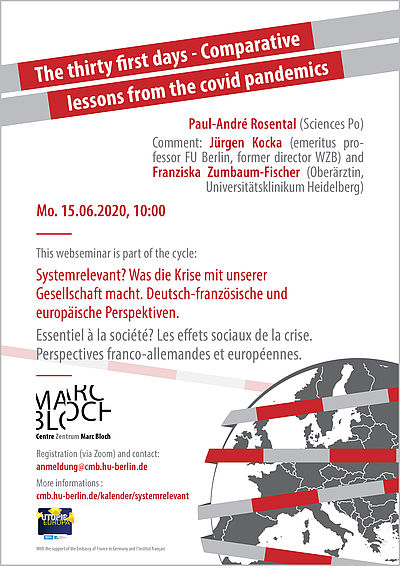ONLINE - The thirty first days - Comparative lessons from the covid pandemics
15. Juni | 10:00
Paul-André Rosental - CHSP-Sciences Po (Paris)
Comment : Jürgen Kocka (Prof. em., FU Berlin / former director WZB) and Franziska Zumbaum-Fischer (Oberärztin Universitätsklinikum Heidelberg).
15 June 2020 - Webseminar in english - via ZOOM
The Covid-19 pandemic is a singular event, but it does not stand alone. It follows a succession of virus attacks which have followed each other since the 1950s. At the same time, the pathologic havoc the COVID wreaks on human systems is mirrored in the ways it undermines the structural integrity of the entire health infrastructure, a system already stressed by chronic and increasingly complex disease management and by an aging population.
Thus, we should not focus on the exceptionality of the current crisis, but rather use it as a test-case for a key question: which patterns of action have proved most effective in addressing the emergency? The answer requires the comparison of mortality data, which beyond their inherent registration biases, are made incomparable by the different morphologies of each national population. Density, concentration, mobility, age structure: all those parameters need to be controlled before being put in relation with variables describing national public health systems. On that basis, one can identify very different patterns and issues in the fight against the epidemics, and raise questions on the potential evolutions of 21st century health systems.
The author is a full professor in modern history at Sciences Po in Paris, and a member of council of the Population Europe network based in Berlin. He has led an Advanced ERC Grant at the crossroads between medicine and social sciences, on social and environmental risks factors associated with a range of idiopathic, systemic inflammatory diseases, which has led to several publications in the Lancet. He also authored Silicosis. A World History at Johns Hopkins University Press in 2017, and recently published A Human Garden: French Policy and the Transatlantic Legacies of Eugenic Experimentation, New York, Berghahn Books (2020); and Population, the State, and National Grandeur. Demography as a political science in modern France, Peter Lang (2018).
His presentation will be based on the report he published last month (http://tnova.fr/notes/un-balcon-en-foret-2020-essai-comparatif-sur-l-epidemie-de-covid).
Registration : anmeldung@cmb.hu-berlin.de
Kontakt
Noa Levin
noa.levin ( at ) cmb.hu-berlin.de
